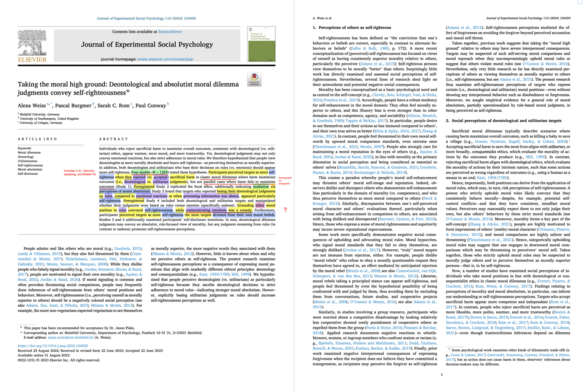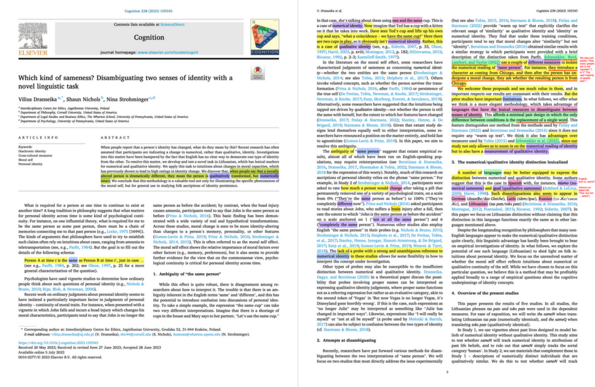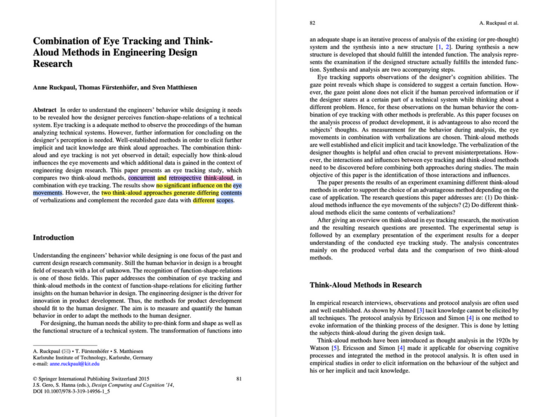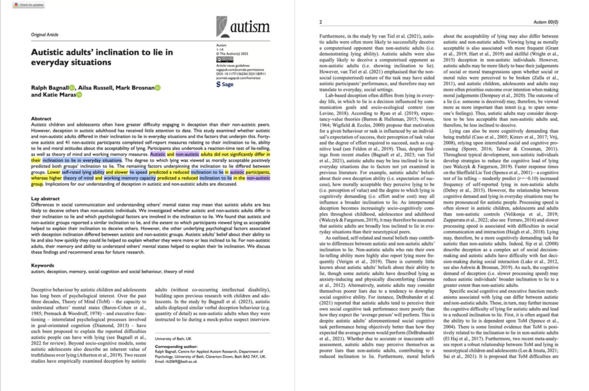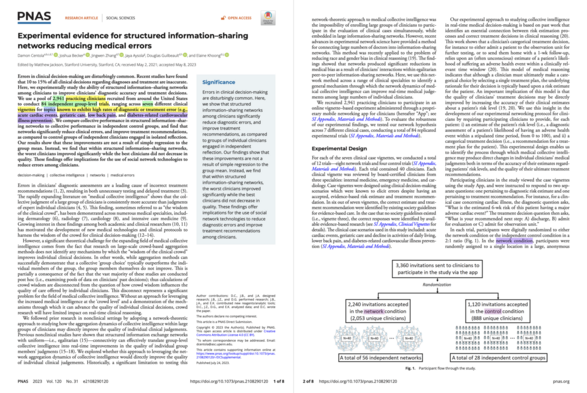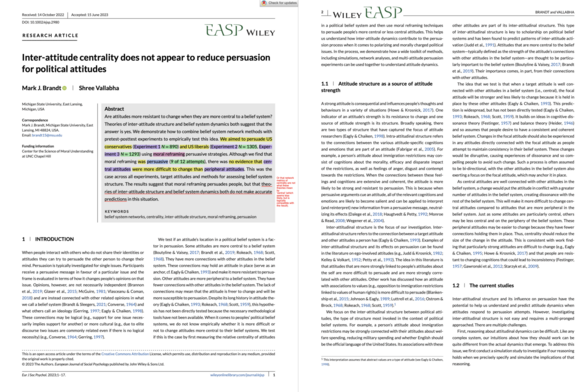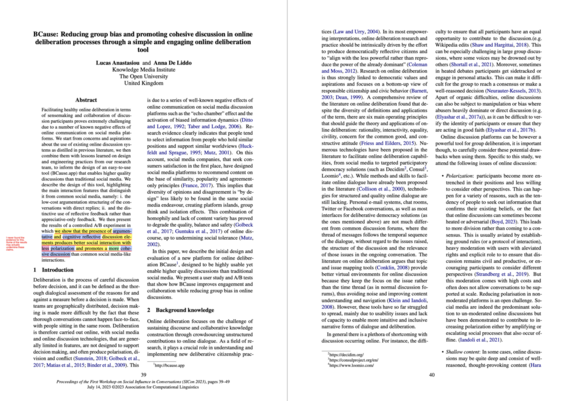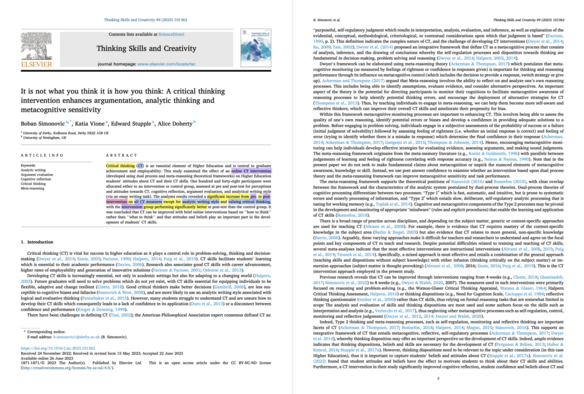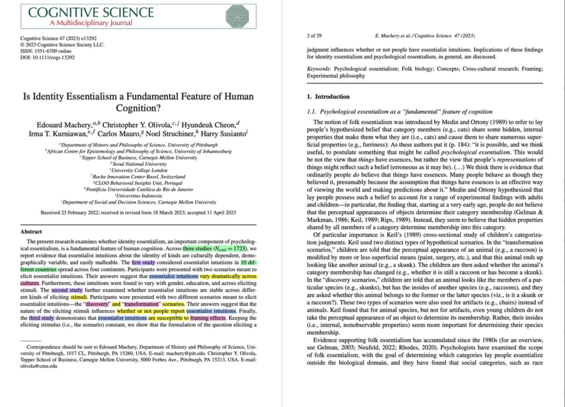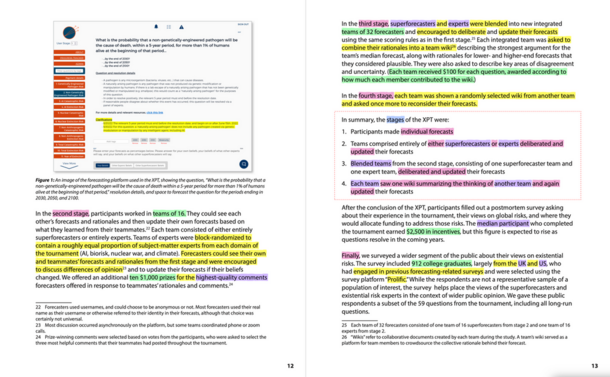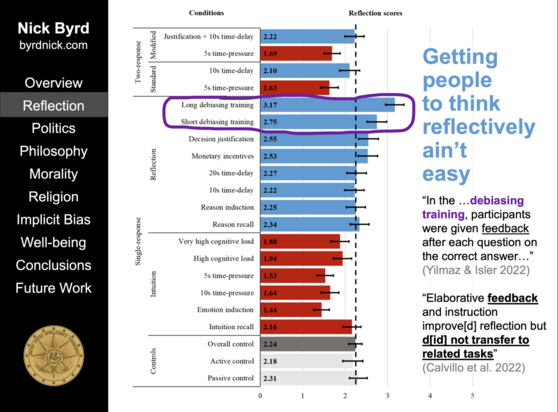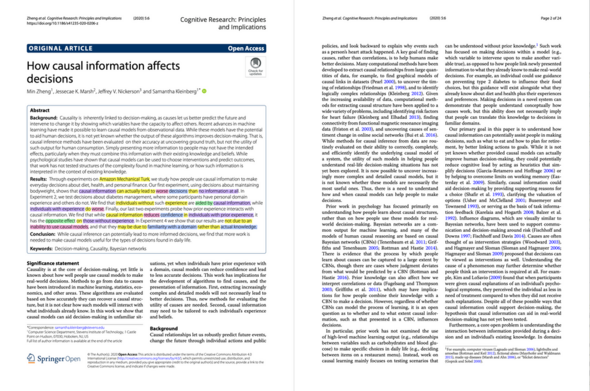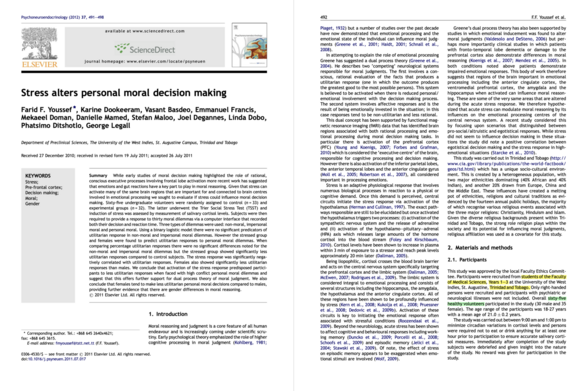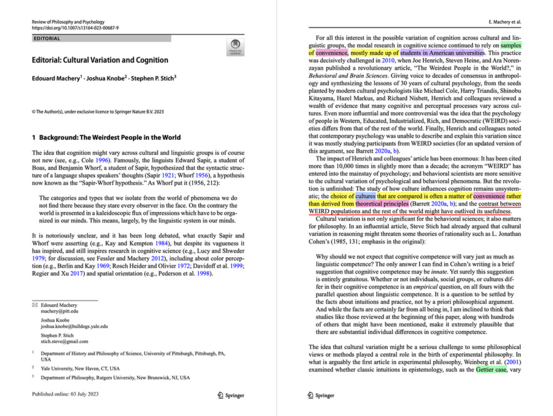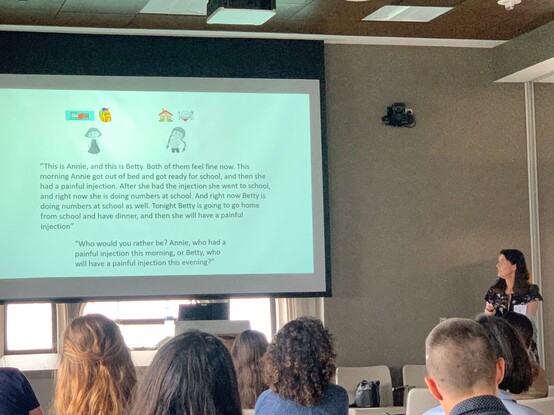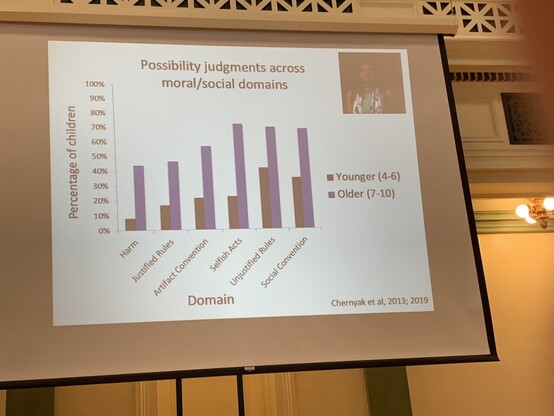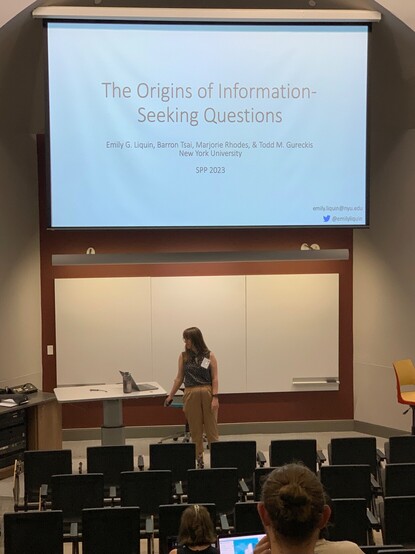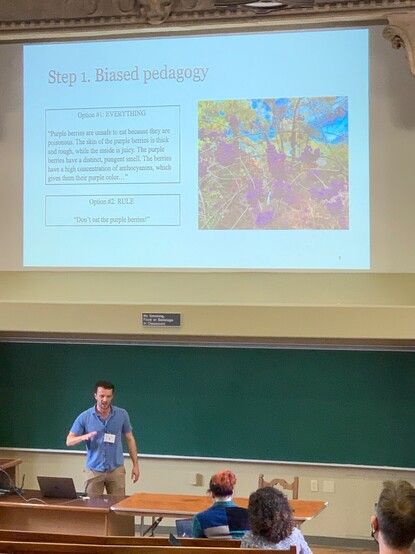Nick Byrd · @ByrdNick
930 followers · 575 posts · Server nerdculture.de"Deontological and absolutist moral dilemma judgments convey self-righteousness" in U.S., German-speaking, and British participants (N = 1254).
In the Journal of Experimental Social Psychology: https://doi.org/10.1016/j.jesp.2023.104505
#ProcessDissociation #DecisionScience #psychMethods #moralPsychology #xPhi
#processdissociation #decisionscience #psychmethods #moralpsychology #xPhi
Nick Byrd · @ByrdNick
927 followers · 567 posts · Server nerdculture.deThe "One, but not the same" results that we detected in English speakers (https://doi.org/10.1007/s11098-021-01739-5) replicated 6 times in Lithuanian speakers (https://doi.org/10.1016/j.cognition.2023.105545).
When people read about morally altered people being "different, they [thought] the person [wa]s qualitatively transformed, but numerically intact."
#ExperimentalPhilosophy #xPhi #Philosophy #PhilMind #PersonalIdentity #QuantPsych #DecisionScience #CogSci #psychometrics #Linguistics #CrossCulturalResearch
#experimentalphilosophy #xPhi #philosophy #philmind #personalidentity #quantpsych #decisionscience #cogsci #psychometrics #linguistics #crossculturalresearch
Nick Byrd · @ByrdNick
921 followers · 559 posts · Server nerdculture.deHow do we know what participants thought when we presented our stimuli?
#ProcessTracing can reveal what people saw (e.g., eye-tracking), consciously thought (e.g., concurrent think-aloud), etc.
Combining those two methods revealed:
(1) thinking aloud didn't impact gaze or word count
(2) retrospective think-aloud left out thoughts that were mentioned concurrently
(3) retrospective think-aloud introduced thoughts unmentioned concurrently
#processtracing #psychmethods #cogsci #xPhi
Nick Byrd · @ByrdNick
910 followers · 548 posts · Server nerdculture.deAutistic adults weren't more likely to report lying in everyday situations than non-autistic adults (p - 0.259).
Age and theory of mind predicted fewer lies from non-autistic adults, but not autistics adults.
Lie acceptability predicted more lies in both groups.
#DevPsych #ethics #autism #asd #moralpsych #xPhi
Nick Byrd · @ByrdNick
902 followers · 540 posts · Server nerdculture.de🚨 Free book alert!
Reason and Less: Pursuing Food, Sex, and Politics via #MITpress: https://doi.org/10.7551/mitpress/12811.001.0001
Dr. Goel follows arguments and evidence from multiple fields in cognitive science to some challenging conclusions about common beliefs. An #openAccess gem!
#neuroscience #psychology #cogSci #epistemology #decisionScience #xPhi #politics #religion #diet
#mitpress #openaccess #neuroscience #psychology #cogsci #epistemology #decisionscience #xPhi #politics #religion #diet
Nick Byrd · @ByrdNick
901 followers · 532 posts · Server nerdculture.deErrors in medical decisions are well-known. Can micro consultations help doctors overcome?
Risk assessments were improved by showing clinicians the average risk assessment of 4 peer clinicians (compared to clinicians who assessed risk without peer information). Importantly, the least accurate clinicians improving most and the most accurate clinicians were not affected. N ≅ 3000 clinicians, 84 trials
#medicine #decisionscience #rationality #epistemology #xPhi
Nick Byrd · @ByrdNick
901 followers · 522 posts · Server nerdculture.de“Are attitudes more resistant to change when they are more central to a belief system?”
Researchers changed conservatives’ and liberals’ attitudes (!) using moral reframing.
However, they found “no evidence that central attitudes were more difficult to change than peripheral attitudes”.
#politics #epistemology #psychology #xPhi #quine
Nick Byrd · @ByrdNick
901 followers · 522 posts · Server nerdculture.deCan the civic and rational benefits of discussion and argument mapping be combined?
Platforms like BCause and Kialo attempt to find out.
Here's a recent conference paper about the former: https://aclanthology.org/2023.sicon-1.5
#CriticalThinking #CogSci #Rationality #DecisionScience #xPhi #Logic #polarization
#criticalthinking #cogsci #rationality #decisionscience #xPhi #logic #polarization
Nick Byrd · @ByrdNick
897 followers · 517 posts · Server nerdculture.deIf tiny manipulations to a survey won’t get people thinking more reflectively, what will?
Three 15-minute online critical thinking video lessons improved performance on reflection tests and other quantitative measures of reasoning ability (N ≅ 150 Prolific workers) .
https://doi.org/10.1016/j.tsc.2023.101362
#CogSci #Epistemology #edu #Philosophy #xPhi #DecisionScience
#cogsci #epistemology #edu #philosophy #xPhi #decisionscience
Nick Byrd · @ByrdNick
897 followers · 517 posts · Server nerdculture.deWhat was the most potent predictor of making so-called essentialist judgments about thought experiments?
😳THE SURVEY MEDIUM?!
Across 10 countries, people who completed the survey with paper and pencil (vs. online) were WAY more likely to exhibit the so-called essentialist judgment.
Why? Exclusion criteria weren't the same for each medium. Sooo 🤷♂️.
#xPhi #culture #psychology #essentialism
Nick Byrd · @ByrdNick
884 followers · 508 posts · Server nerdculture.deCan disagreement and deliberation change experts' minds? If so, what kinds of conditions will encourage experts to consider changing their minds?
A multi-stage tournament reports that "Few minds were changed..., even among the most active participants, despite monetary incentives for persuading others." Still, "superforecasters had a slightly greater tendency to converge over time than experts."
https://forecastingresearch.org/xpt
#rationality #expertise #epistemology #cogSci #xPhi #risk #AI #forecasting
#rationality #expertise #epistemology #cogsci #xPhi #risk #ai #forecasting
Nick Byrd · @ByrdNick
886 followers · 498 posts · Server nerdculture.deGetting people to think reflectively ain’t easy.
The best improvements in reflection test performance often involve explaining the correct answers (https://doi.org/10.3758/s13428-022-01984-4). 🤨
Unfortunately, that improved reflection does not seem to transfer to related tasks (https://doi.org/10.1080/13546783.2022.2075035). 🤦♂️
During my IC postdoc., we may have found better methods. We’ll share in upcoming talks and preprints (some may already be on gScholar or ResearchGate if you see this later).
Nick Byrd · @ByrdNick
882 followers · 490 posts · Server nerdculture.de🤔 "causal information at decision time can lead to less accurate choices in domains that relate to existing knowledge".
Possible explanations: (a) fluency effect or (b) expertise reversal effect.
https://doi.org/10.1186/s41235-020-0206-z
#PhilosophyOfScience #PhilSci #xPhi #Epistemology #Causation #DecisionScience #cogSci
#philosophyofscience #philsci #xPhi #epistemology #causation #decisionscience #cogsci
Nick Byrd · @ByrdNick
878 followers · 488 posts · Server nerdculture.deWhat's the difference between microtask platforms like #mTurk or Prolific and market-research panels?
CloudResearch recently published an #openAccess paper that explains. (The paper also includes a step-by-step tutorial for using their "Prime Panels" in conjunction Qualtrics).
https://doi.org/10.1177/25152459221140388
#humanSubjectsResearch #researchMethods #surveyMethodology #Psychology #CogSci #xPhi
#mturk #openaccess #humansubjectsresearch #researchmethods #surveymethodology #psychology #cogsci #xPhi
Nick Byrd · @ByrdNick
862 followers · 481 posts · Server nerdculture.deWhat proportion of medical students said it is "appropriate" to "sacrifice" a fatally-injured CHILD and EAT HIS REMAINS in order to allow you and another adult to live?
😳 Up to 60%?!
The rate of these so-called "utilitarian" responses was half (or less) among people who spent 20-30 minutes in #stress-inducing conditions (compared to browsing a biology textbook): https://doi.org/10.1016/j.psyneuen.2011.07.017
#xPhi #medicine #ethics #psychology #decisionScience #stress
#stress #xPhi #medicine #ethics #psychology #decisionscience
Nick Byrd · @ByrdNick
848 followers · 476 posts · Server nerdculture.deThe introduction to Review of #Philosophy and #Psychology’s issue on "Cultural Variation and #Cognition" is out!
Machery, Knobe, and Stich introduce "Great Minds Do Not Think Alike:..." (https://doi.org/10.1007/s13164-022-00628-y) and 15 other theoretical, methodological, or empirical papers about the import of demographic differences for philosophical psychology.
Short and sweet (< 10 pages): https://doi.org/10.1007/s13164-023-00687-9
#philosophy #psychology #cognition #culture #crossculturalresearch #cogsci #xPhi
Nick Byrd · @ByrdNick
823 followers · 453 posts · Server nerdculture.deTeresa McCormack closed the #SPP2023 #preconference on #memory with “The value of remembering and anticipating experiences: a developmental perspective”
It was—as Teresa put it—dangerously close to an #xPhi talk. It adapted a famous thought experiment (from Derek Parfit?) to test kids’ and adults’ intuitions about how much we care about past, present, or future versions of us.
Follow Dr. McCormack on gScholar: https://scholar.google.com/citations?user=g9T7yn8AAAAJ&hl=en&oi=ao
#spp2023 #preconference #memory #xPhi #personalidentity #philmind #psychology #DevPsych #p4c
Nick Byrd · @ByrdNick
821 followers · 447 posts · Server nerdculture.deTamar Kushnir’s #SPP2023 presidential address tried to answer, “When do children become responsible for moral decisions?”
Evidence suggests people’s opinions vary by culture, as do laws, but there’s evidence that kids develop the ability to understand moral aspects of decisions (including that some decisions seem to be moral).
Find/follow Dr. Kushnir on gScholar: https://scholar.google.com/citations?user=TMuSMXoAAAAJ&hl=en
#spp2023 #DevPsych #ethics #philmind #cogsci #xPhi
Nick Byrd · @ByrdNick
821 followers · 446 posts · Server nerdculture.deEmily Liquin presented “The Origins of Information-Seeking Questions”
People
1. re-used previously seen “question templates”
2. even “novel" questions were similar to templates.
This anchoring decreased with age.
Curiously, older kids and adults didn’t ask questions that could reveal more information.
Collaborators: Barron Tsai, Marjorie Rhodes, & Todd Gureckis
Dr. Liquin’s on gScholar: https://scholar.google.com/citations?user=IdymDGQAAAAJ&hl=en&oi=ao
#xPhi #Epistemology #Rationality #Intelligence #Psychology #CogSci #SPP2023
#xPhi #epistemology #rationality #intelligence #psychology #cogsci #spp2023
Nick Byrd · @ByrdNick
821 followers · 445 posts · Server nerdculture.de“Norm Emergence from Cognitive Biases and Cultural Transmission” presented by Scott Partington
Three experiments suggest that people
- Infer impermissibility from imprudence
- that impermissibility can be retained
Why care? Cuz we see biased pedagogy that caused this deontic inference in many developmental contexts (like teaching and parenting).
Collaborators: Rachana Kamtekar, Shaun Nichols
Scott’s on gScholar: https://scholar.google.com/citations?user=jAq0UGIAAAAJ&hl=en&oi=ao
#DevPsych #xPhi #ethics #teaching #cogsci #spp2023
